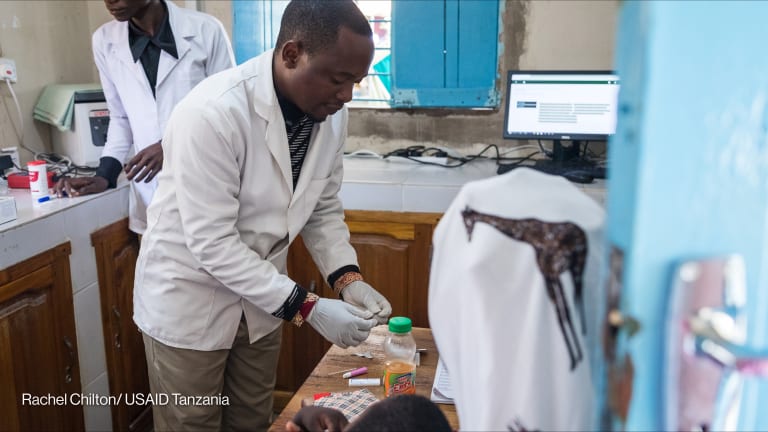Opinion: Collaborative solutions key to advance universal health coverage
A series of global health paradigm shifts are needed if we are to achieve universal health coverage — based on robust partnerships.
The 2023 U.N. General Assembly highlighted a stark reality: the world is falling short of achieving health coverage by 2030. It is a sobering fact that over 4.5 billion people lack comprehensive access to essential health services and that 2 billion people grapple with financial hardship after accessing lifesaving health services. Yet the majority of essential UHC interventions can be delivered through a primary health care approach. As the director-general of the World Health Organization, Tedros Adhanom Ghebreyesus, emphasized at UNGA, primary health care remains the most inclusive, equitable, cost-effective, and efficient path to UHC. While health systems lack the sustained funding, workforce capacity, tools, medicines, and health information systems required to provide high-quality health care, UHC will never be achieved. The power of collaboration No single country or entity can achieve UHC on its own. Realizing the vision of “health for all” requires a concerted effort by governments, private sector, civil society, nonprofits, development partners, and other stakeholders to strengthen political commitment. This commitment must be to drive action toward health systems strengthening, sustainable health financing, investment in human resources for health, enhanced access to medicines and vaccines, and coordinated monitoring and evaluation to measure progress. Prior to the pandemic, WHO estimated that low- and middle-income countries needed an additional $371 billion annually by 2030 to reach health-related Sustainable Development Goals. Recent factors, including conflicts, climate change, and economic instability, have amplified the need for more funding. Preparing for future pandemics will require a massive investment of about $31.1 billion annually, with a third of that investment coming from international sources. Yet countries are struggling to secure the funds needed for UHC due to economic strains, tight budgets, and decreasing development assistance. Innovative funding sources are essential. To tackle this global challenge, the African Development Bank, the European Investment Bank, the Islamic Development Bank, and WHO launched the Health Impact Investment Platform, with an initial aim to provide €1.5 billion ($1.6 billion) in concessional loans and grants to low- and middle-income countries. Resources from partners such as the European Commission will be used to reduce investment risks and make conditions attractive for participating countries. The Inter-American Development Bank is also considering joining this effort to extend it to Latin America and the Caribbean. New innovations — and new ways of working In addition to sustainable finance, scaling up affordable, contextualized health innovations can help achieve lasting and widespread impact. People-centered solutions ensure that the focus remains on individuals and communities, leading to more effective, sustainable, and equitable health services and improved health outcomes. These contextualized health innovations aren’t limited to drugs or devices, they also include stronger health information systems, more resilient supply chains, and well-paid health workers equipped with the tools and approaches they need to deliver robust, people-centered primary health care. For instance, diagnostics systems that are digitized to adapt and integrate with the broader health care ecosystem not only improve the accuracy, efficiency, and accessibility of medical diagnostic technologies and data — if built appropriately, they can be accessible at both the community and facility level, helping to engage and empower patients as active participants in their own care. At least four sector-wide paradigm shifts are needed to realize UHC, these are: 1. Research, development, and scale-up of demand-driven innovations. Devices, medicines, and service delivery approaches designed by and for the people who use them improve outcomes, extend health care delivery, and strengthen local technical capacities. 2. Secure, paperless, public health systems that span cities and countries. Digital technologies and systems strengthen disease surveillance, enhance health system resilience, and improve the safety, quality, and accessibility of health information and services. 3. Sustainably financed, threat-resilient, integrated health services. Holistically and sustainably funded health services that work together to support community health improve access for everyone and ensure continuity of care — even during emergencies. 4. New markets and regulatory systems for local producers of essential medicines and devices. Strong markets, regulatory systems, and supply chains ensure people — and the health systems that support them — have equitable, uninterrupted access to critical health commodities. Each of these shifts — and the entire global health sector — require more equitable, locally led approaches, so PATH has created Equity in Programming Benchmarks that our peers can use to surface and quantify inequities in prioritization, program design, and implementation. As Dr. Tedros reminded us at UNGA, UHC is a political choice that U.N. member states must champion. However, they cannot achieve UHC by working on their own. Innovative and sustainable finance and robust partnerships with multiple stakeholders are pivotal for UHC to become a reality. But for these partnerships to succeed, they must be culturally appropriate, people-centric, and ensure that they leave no one behind.
The 2023 U.N. General Assembly highlighted a stark reality: the world is falling short of achieving health coverage by 2030.
It is a sobering fact that over 4.5 billion people lack comprehensive access to essential health services and that 2 billion people grapple with financial hardship after accessing lifesaving health services. Yet the majority of essential UHC interventions can be delivered through a primary health care approach.
As the director-general of the World Health Organization, Tedros Adhanom Ghebreyesus, emphasized at UNGA, primary health care remains the most inclusive, equitable, cost-effective, and efficient path to UHC. While health systems lack the sustained funding, workforce capacity, tools, medicines, and health information systems required to provide high-quality health care, UHC will never be achieved.
This article is free to read - just register or sign in
Access news, newsletters, events and more.
Join usSign inPrinting articles to share with others is a breach of our terms and conditions and copyright policy. Please use the sharing options on the left side of the article. Devex Pro members may share up to 10 articles per month using the Pro share tool ( ).
The views in this opinion piece do not necessarily reflect Devex's editorial views.
Nikolaj Gilbert is the president and CEO of PATH, an international nonprofit focused on advancing health equity through innovation and partnerships. He brings over 25 years of experience across the private sector, nonprofits, and multilateral organizations. Before joining PATH in 2020, Nikolaj served as director of partnerships for the United Nations Office for Project Services and held leadership roles at Novo Nordisk.








